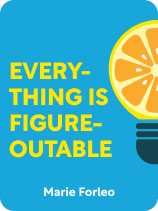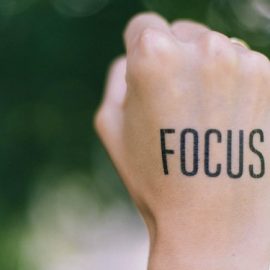

This article is an excerpt from the Shortform book guide to "Everything Is Figureoutable" by Marie Forleo. Shortform has the world's best summaries and analyses of books you should be reading.
Like this article? Sign up for a free trial here.
Why do we have negative core beliefs? How can we get rid of those harmful beliefs?
In Everything Is Figureoutable, Marie Forleo explores why beliefs matter and how you developed your current beliefs—some of which might be negative. Additionally, she examines how believing that all issues are solvable can mitigate the harm of what you believe and transform your life.
Continue reading to learn how to ignore your negative core beliefs.
Understanding Your Current Beliefs
Forleo defines a belief as a conviction—something that you know to be correct. Your beliefs are important because they drive what you do and how you react to the world. For example, if you believe you’re bad at math, you might not study for your math test because you don’t see the point—leading you to fail, which reinforces your belief that you’re bad at math.
Forleo explains that while you can actively decide what you believe, you likely also have several negative core beliefs that you’ve developed unknowingly. Most of your beliefs stem from five sources: your surroundings, proof, your models, your history, and your dreams.
For example, you might believe you’re bad at math because your family says math is for boys (surroundings) or because your high school teacher said math was your weakest subject (proof). You might believe you can get into Harvard because your cousin did (models). You might believe you can become a professional writer because you won a writing competition (history) or simply because you want to be one (dreams).
Forleo warns that not all beliefs are good for you; some have harmful consequences. Although it’s possible to change these beliefs, it’s difficult due to our human tendency toward confirmation bias: We retain information that reinforces our underlying beliefs while ignoring contradictory evidence. For example, having abusive parents may instill in you a belief that you’re unworthy of love. So if your boyfriend dumps you, you’ll see it as confirmation that you’re unworthy of love—even though the fact that you’ve had the same best friend for decades suggests otherwise.
(Shortform note: In The Art of Thinking Clearly, Rolf Dobelli notes that confirmation bias reinforces not just your underlying beliefs but things that you want to be true. For example, if you want someone to like you, you’ll pay attention to clues that indicate that they do and ignore ones that don’t. However, your underlying beliefs ultimately overpower these desires—which explains why you’ll find evidence that reinforces your harmful beliefs (for instance that you’re unworthy of love) rather than evidence for your desires (that you’re worthy of love). To combat your confirmation bias and change your harmful beliefs, Dobelli recommends that you write down your beliefs and find evidence that disproves them.)
How to Protect Yourself From Harmful Beliefs
Instead of changing your negative core beliefs, Forleo recommends you add a new belief: that you can figure out anything you set your mind to. When you believe in this philosophy, you’re able to combat the negative effects of having harmful beliefs without having to do the work of identifying and dismantling each one. Moreover, repeatedly acting according to this philosophy will make it even more beneficial because biology dictates that the more you repeat something, the stronger it embeds itself into your brain. So the more you tell yourself that all issues are solvable, the stronger your belief becomes.
For example, if you believe that everything is figureoutable, you won’t despair that you’re unworthy of love when your boyfriend dumps you. Instead, if you pinpoint the issue as “I don’t feel loved because my boyfriend dumped me,” you’ll look for ways to maximize feeling loved—whether that’s by dating again or looking for and learning to appreciate the love from others (like your best friend) that you do have in your life.
To illustrate the power of believing that all issues are solvable, Forleo describes her own career trajectory. After graduating college, Forleo had several jobs, but none of them felt like the right path. When she learned about life coaching—still a relatively new career option at the time—she realized she wanted to become a life coach, but she had no idea whether she would succeed at it. She started her own life coaching business anyway, bolstered by the belief that she could overcome any issue she faced. This choice led to major success—Forleo built her life coach business into a multimillion-dollar company.
(Shortform note: Forleo may have grown so successful precisely because she struggled to find the right career. In Range, David Epstein suggests that not knowing exactly what you want to do is better than knowing exactly what you want from an early age. Epstein argues that generalists (people who are broadly competent in several fields) are better suited to success than specialists because they have more transferable skills and are thus better able to adapt to the ever-changing realities of the modern world—including new technologies and new careers (like life coaching)—to solve problems.)

———End of Preview———
Like what you just read? Read the rest of the world's best book summary and analysis of Marie Forleo's "Everything Is Figureoutable" at Shortform.
Here's what you'll find in our full Everything Is Figureoutable summary:
- How to apply the "everything is figureoutable" philosophy to your life
- How you can achieve your dreams and overcome all obstacles
- How to respond when you encounter criticism






